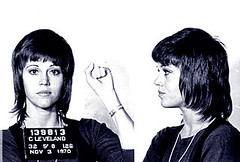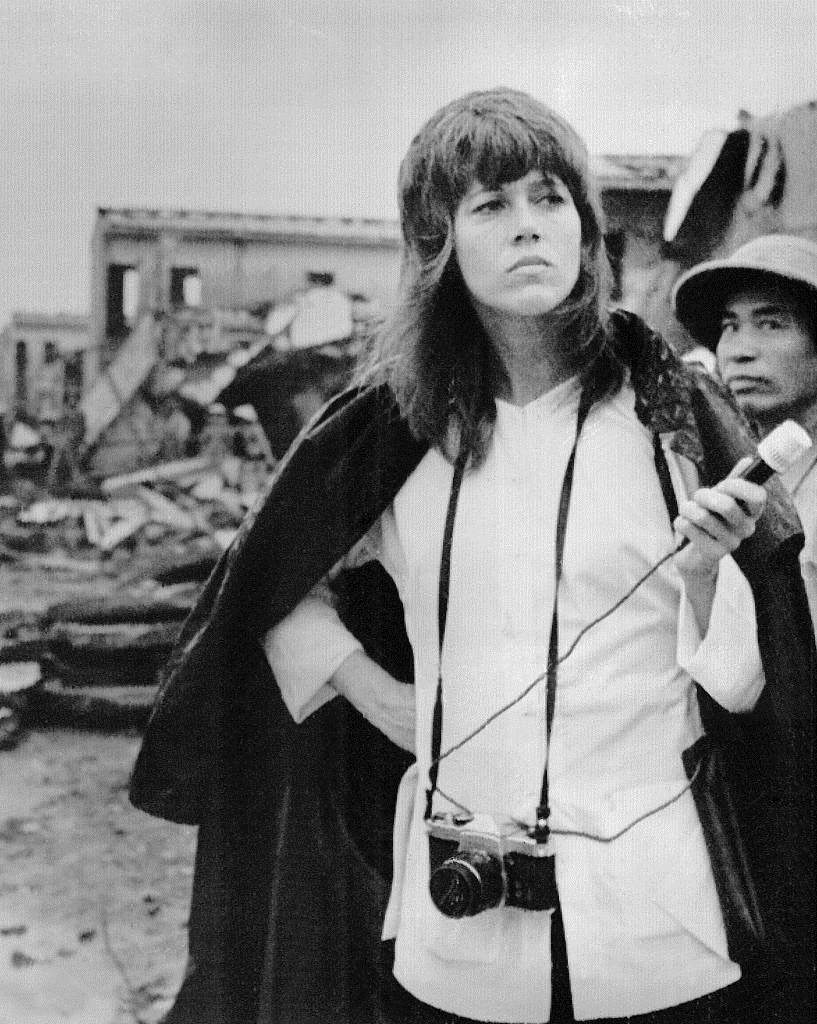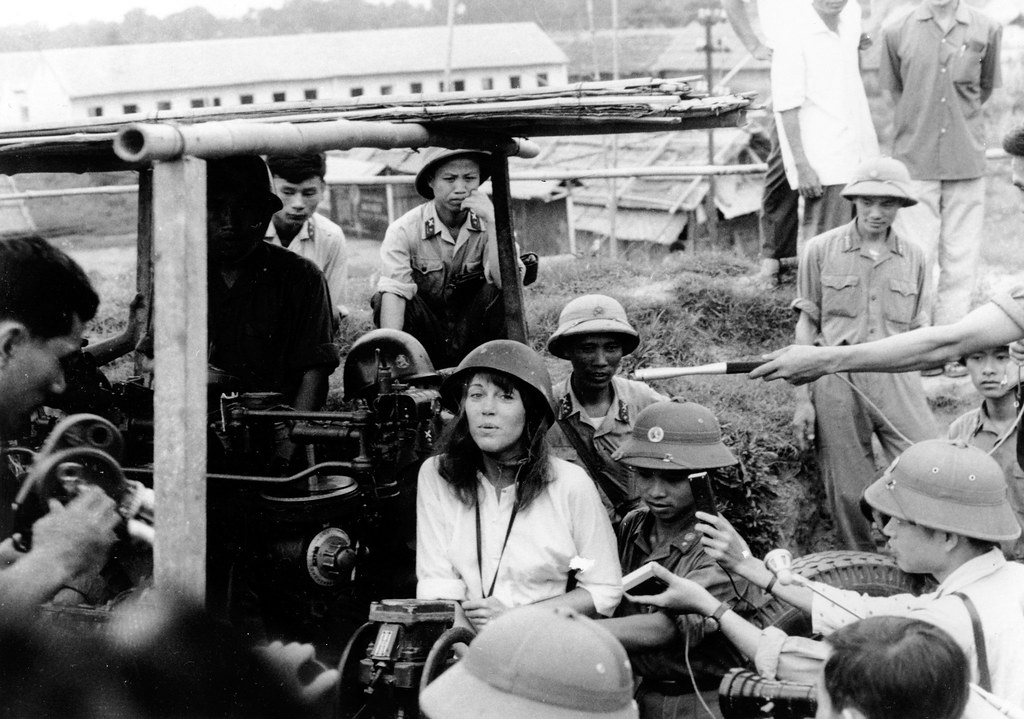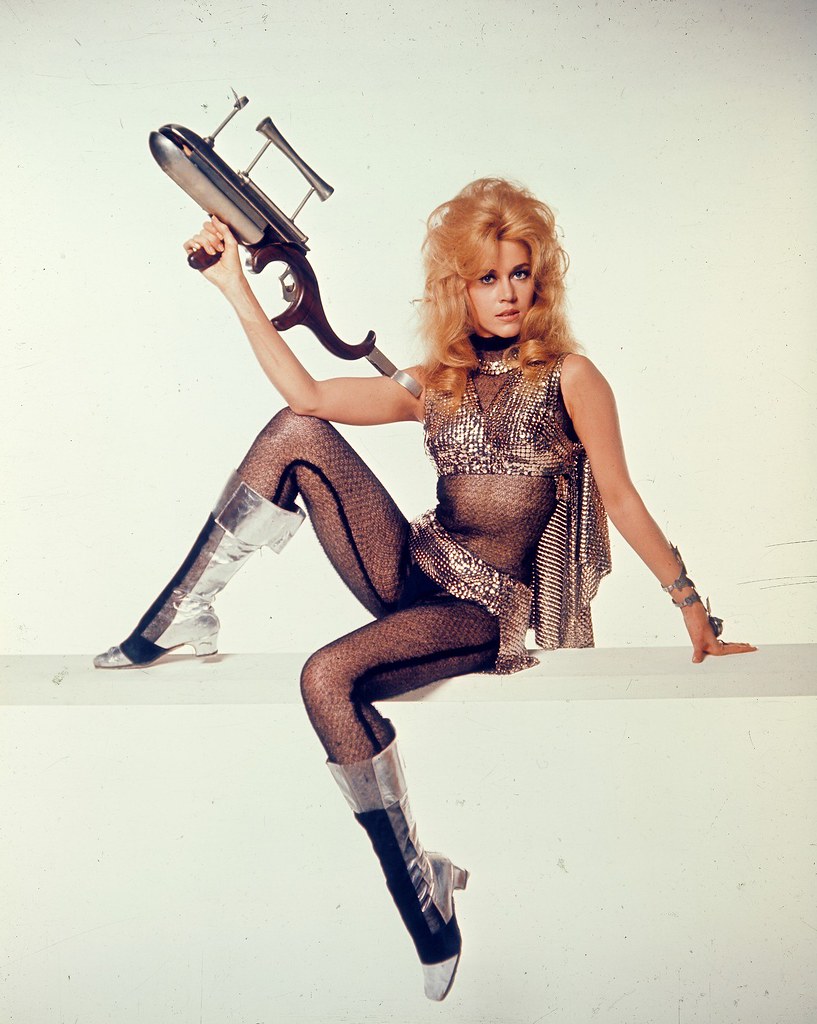6th November 2023
Listen
Listen

March is Women’s History Month. This month-long recognition of the power of women comes as International Women’s Day is celebrated on March 8th. Raising awareness and empowering women, the month showcases and celebrates women, their lives and their achievements. To celebrate, I’ll be writing articles about women who inspire me.
Jane Fonda. What in the world is the matter with Jane Fonda?
President Richard Nixon
I’m starting with Jane Fonda. If you don’t know who she is already, I pity you. Have no fear though, you’re about to find your new hero.
Jane Fonda had a difficult childhood. She grew up in the shadow of her father, Hollywood legend and all-American, Henry Fonda. Spending a lot of time alone, she didn’t feel the love from her parents that she saw in other families. She was particularly detached from her mother and described feeling an “aversion to her” and finding her “weak”.
Her mother died three months after her father divorced her. Young Jane found out from a magazine this was the result of suicide, while her mother was an inpatient at a psychiatric hospital. When Jane petitioned for her hospital records, she discovered that she had bipolar disorder and bulimia, and had faced sexual abuse throughout her childhood.
I was Henry Fonda’s daughter. Which of course meant, I was polite and I was nice, I was the girl next-door. All the things I didn’t feel that I was. I didn’t like my body, I didn’t like myself, I felt shy. We looked like the American dream… but a lot of it was simply myth.
Jane Fonda
It transpired Henry had been having an affair and was hyper-critical; in fact, three of his five wives had eating disorders. When her mother died and she was sent to boarding school, Jane took an interest in history and the Romans. She learned that they indulged on rich food, purged and continued. Jane and her friend started to do it too, believing they were the only ones and not understanding the complexities of the addiction.
Her father told people that she was fat and an embarrassment. He sent her step-mother to tell her to lose weight and wear longer skirts. She went through a cycle of bulimia and anorexia, “eating maybe one soft boiled egg a day with spinach”, through most of her life. She forced herself to stop in her forties, by ‘going cold-turkey’ and recovering.
When she learned the truth about her mother, she felt compassion for her; relating to her more, especially after she had her own daughter and faced postnatal depression. She also believes her father had undiagnosed depression. She began to tell their stories and advocate for people’s mental health and to educate people about eating disorders. Her hope was nobody else would think they were going through it alone, saying, “we have to understand that mental health can cast a shadow over future generations”.
There was so much catching up to do, about Vietnam and about Native Americans and about what was happening to Black people, the Black Panthers. How could I have reached the age of thirty-two in such ignorance? I felt so guilty and I just felt like I had to kind of, all of a sudden, become an overnight righteous activist.
Jane Fonda
With a young child, freshly divorced and living back at her father’s house, Jane became an activist. She regularly met with leaders of the Black Panthers and held fundraisers at her home. She campaigned with them and for them, particularly for Angela Davis, who she visited in prison. Showing solidarity for protests by Native Americans, she helped them bargain with government officials and visited their picket lines. She was arrested in 1970 (as seen in the cover image, rocking the iconic Klute haircut), on suspicion of ‘drug trafficking’, when returning from an anti-war tour in Canada; however, these were vitamins she was taking to attempt to supplement her anorexic eating pattern. She was also arrested five times for distributing copies of the Uniform Code of Military Justice outside military bases.
Despite being Miss Army Recruiter in 1959, in 1972, she began her most famous (and infamous) anti-war activism. Touring North Vietnam for two weeks, she recalled being able to see American planes bombing the country as she arrived. She met many Vietnamese civilians and soldiers and interviewed them; she spoke out against the American government and Nixon, appealing to troops directly over radio, to “consider” their role.
I beg you to consider what you are doing. The hospitals are filled with babies and women and old people. Can you justify what you are doing? If they told you the truth, of what your targets really are, you wouldn’t fight, you wouldn’t kill. You were not born and brought up by your mothers to be killers. We must all try very, very hard to remain human beings.
Jane Fonda

Told that Nixon’s plan was to specifically bomb the dikes of Vietnam, effectively leading to the drowning and starvation of hundred’s of thousands of people, Fonda vowed to stop it. Washington argued against the claims but Nixon was recorded suggesting it. In the end, they didn’t do it and this is attributed almost wholly to Jane Fonda’s vehement protesting.
She became ‘Hanoi Jane’ after sitting on an anti-aircraft gun, clapping and looking happy. She was investigated for acts of ‘treason’ by the government (which was thrown out) and treated with contempt and hatred by the greater public and the government. Later, she apologised, saying, “It was my mistake, and I have paid and continue to pay a heavy price for it.” However, she is still held as one of the main contributors to ending war.

As her activism continued after the war, she was still a target of the CIA, the FBI and the government. While she described it as scary, she found it made her more determined than ever to speak her truth. Not only that, but she was bolstered by a community of activists; including her then husband Tom Hayden, a well known social and political activist and member of the ‘Chicago Seven‘.
She recounted receiving death threats, to her face, as well as having wealthy businessmen and politicians hire people to hold signs in airports saying she should be fed to the whales. People threw smoke bombs through her windows and the FBI broke into and tossed her home. She was the first American citizen to have their bank records taken by the CIA. Fake articles were circulated about her and the government ran multiple smear campaigns against her.
People told her she should step back but she felt a need to keep going. Her husband wanted to move into politics himself and they made a plan to make money to fund the movement. Thus, The Workout was born.
You have to have the courage to speak about the changes that are needed and that includes challenging, at the root, the corporate power that has taken over the economy of this country.
Jane Fonda
Jane Fonda’s Workout may be something you’re familiar with. In 1982, she pretty much singlehandedly opened up the fitness industry to women. The workout tape became the first non-theatrical release to top VHS charts and was the top selling tape for SIX YEARS! The series sold over 17 million copies altogether and the original workout was the highest selling VHS of the 20th century. She was even honoured by the Video Hall of Fame, who credited her building the video industry.
We’re talking lycra, we’re talking leg warmers, we’re talking big smiles! The video came after the release of her book (topping The New York Times bestsellers for two straight years) and workout CD and was the beginning of her reign as workout queen. She encouraged the move from women doing light workouts to doing full energy exercise where they actually broke a sweat. The easy accessibility for women to do the workout in their own homes rather than male dominated gyms meant almost every woman in the eighties gave it a go at some point. What’s better, is that it actually worked and it helped her to overcome her eating disorder.
It was a revolution for me but it was completely unintentional.
Jane Fonda
You can even give it a go yourself – without paying your gym membership, without worrying what you look like and while having a giggle at the ridiculous outfits.
While she’s the daughter of actor Henry Fonda and that gave her an insight to the industry, she’s more than paved her own way. If you’re on the younger side, Netflix is where it’s at. It’s also where you’ll find Fonda, in her eighties, in beloved show Grace and Frankie. The show has received no less than 41 award nominations, with Fonda winning Best Actress in a Comedy Series at the OFTAs. This isn’t her first rodeo though. The fabulous actress has won two Academy Awards, two BAFTAs, seven Golden Globes, a Primetime Emmy Award, the AFI Life Achievement Award, and the Honorary Golden Lion, Honorary Palme d’Or and the Cecil B. DeMille Award.
While she faced insecurity and dysmorphia about her body, Fonda has never been afraid of her own sexuality. In her twenties she moved to Paris and married Roger Vadim, a French director. Together they lived what she describes as a ‘hedonistic’ life and he encouraged her to take on more risqué parts, including one of her most famous roles as Barbarella. This comfort with sexuality is still evident in Grace and Frankie, which hinges on women in their golden years gaining sexual pleasure.

She is well known for her many films, TV and play appearances. She also took her activist work into her acting career. Responsible for making such influential films as Coming Home, The China Syndrome and 9 to 5.
Coming Home was about a woman, a wounded war veteran she meets and her husband, who is in the Marines. It took her six years to get her idea for the film green-lit, in the shadow of her “Hanoi Jane” reputation.
The China Syndrome revolved around a TV reporter and her cameraman as they uncovered lies about safety at a nuclear power plant – a mere few weeks later, the Three Mile Island disaster happened and Jane was hailed as a heroine, as people lived through the exact experience that she had depicted.
9 to 5 focused on female office workers and highlighted all the issues that they dealt with in the workplace. It dealt with a boss who was a, “sexist, egotistical, lying, hypocritical bigot” and tackled sexual harassment, unequal pay, and the importance of flexible hours and childcare.
To this day, she continues her crossover of acting and activism. Now a leader in the fight against climate change, she notably accepted her Stanley Kubrick Award for Excellence in Film from BAFTA, while being arrested for her part in the Fire Drill Fridays protests.
An adamant campaigner for women’s rights, Fonda: established the Jane Fonda Center for Adolescent Reproductive Health at Emory University in Atlanta; co-founded the Women’s Media Centre with Robin Morgan and Gloria Steinem; and established the Georgia Campaign for Adolescent Power and Potential.
She has spoken a lot about the problem with women being praised for resilience, rather than being stereotypically emotional; leading to women who, later in life, “won’t express needs, won’t express vulnerability, won’t ask for help”. Having turned off her emotions to deal with the incidents in her childhood, she believes that she never fully managed to turn them back on and it’s damaged her ability to have relationships. As she turned the corner of her last divorce, she took a step back and started living, for the first time, as truly undefined by a man.
She talks about feminism as transforming social and cultural norms, as well as institutions. Taking the primary goal away from, “power, violence, and greed”. Moving from patriarchy to democracy and allowing both men and women to flourish. Jane passionately believes all other issues in the world will be solved by looking at them through a “gender lens”. If it works better for women, it will benefit everyone.
“When I turned 60 and entered my third and final act, I decided that I needed to heal the wounds patriarchy had dealt me. I didn’t want to come to the end of my life without doing all I could to become a whole, full-voiced woman.”
Jane Fonda
You can read her autobiography, My Life So Far, view documentary Jane Fonda in Five Acts on Now TV at the moment or listen to her episode of Jameela Jamil’s podcast, I Weigh with Jameela Jamil.
Cover Image: “Jane Fonda” by Project M·A·R·C is marked with CC BY-NC 2.0.